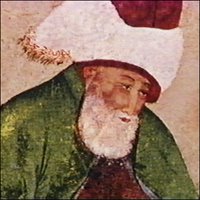 It comes as some surprise to discover that the best selling poet of the '90's in the US was a C13th Muslim cleric who taught sharia law in a madrasa: Maulana Jalaluddin Rumi.
It comes as some surprise to discover that the best selling poet of the '90's in the US was a C13th Muslim cleric who taught sharia law in a madrasa: Maulana Jalaluddin Rumi.William Dalrymple in the Guardian points out some of the ironies surrounding the popularity of Rumi in the West where his verses are " mouthed by such spiritual luminaries as Madonna, Goldie Hawn and Demi Moore" and available in the form of a self-help audiobook: while in the East his work has been entirely neglected. There is no accessible modern edition of his work in contemporary Turkish, while the order of sufi dervishes that Rumi belonged to is outlawed and the open practice of the Sufi mysticism that Rumi represented can still technically result in a seven-month prison sentence.
Rumi was heretical enough to believe that God can "best be reached through the gateway of the heart", that you do not necessarily need ritual to get to Him, and that He is equally accessible to all creeds.
"My religion is to live through love" he said.
Dalrymple says:
It all adds up to an archetypal - if unusually poignant - case of east-west misunderstanding: a west earnestly looking eastwards for an ancient spiritual wisdom, which it receives through the filter of sexed-up translations that most Persian scholars regard as seriously flawed, and which recreate a Rumi wholly divorced from his Islamic context; while in the east, a Republican Turkish government anxious to integrate Turkey with Europe bans Rumi's Sufi brotherhood as part of its attempt to embrace a west it perceives as rational, industrial, intolerant of superstition and somehow post-mystical.Here are lines I love from a Rumi poem called Spring Giddiness :
Today, like every other day, we wake up empty
and frightened. Don't open the door to the study
and begin reading. Take down a musical instrument.
Let the beauty we love be what we do.
There are hundreds of ways to kneel and kiss the ground.
7 comments:
Listen to the way
this reed flute grieves,
telling stories of its separations
--Rumi, Masnavi
Reading this brings to mind two incidences when I was in Istanbul. The first was a graduates forum held in a hotel for exchange students like me in Kumburgaz and the discussion was about Turkey and the European Union. I remembered thinking how sad it is that Turkey had to discard its history and religious identity to be accepted by a bunch of instituitionalists.
The second was a dervish dance which I went to once - all the dancers were both men and women - and they all looked European to me.
Hey I saw the documentary too, though it was more on the music rather than on sufi practices. My very awake 2 year old enjoyed it, nodding her head in time to the music - old sufi soul, as mom kept nodding off - it was midnight!
Agree with Anisah - wish there was more meat.
Sharon, Rumi is popular, but I love Hafiz more. Try him sometime.
Animah, back from UK
thanks has, anisah, fiona, animah for adding to the little I knew ... for making me sad that I didn't manage to see the documentary ... and especially for nthe further reading recommendations ...
It is funny isn't it, how we assume muslims to be dark and tanned. The idea of a caucasian muslim is somehow "wrong".. no idea why that is.
anonymous - you're right about that. and my turkish muslim friends are caucasian ...
Your "blabbing on" was enjoyable Anisah. I sincerely thank you for it. Thanks too for the offer to record something for me ... might take you up on that. (If the Rumi programme is ever repeated ...)
Post a Comment